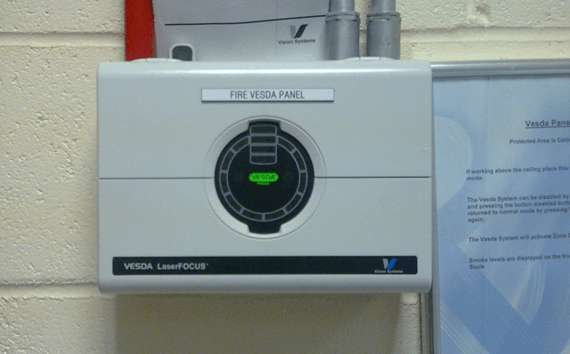

VESDA (an abbreviation of Very Early Smoke Detection Apparatus) is a laser based smoke detection system. The name VESDA has become a generic name for most air sampling applications. The name VESDA is a trade mark of trails.
Having been operating within specialist fire detection applications for over 20 years, the VESDA system has a proven track record and has been developed beyond traditional fire alarms, to the point where it is recognized as the most advanced aspirating smoke detection system within the fire industry, holding more certifications than any other aspirating smoke detector in the world.
A VESDA detector is much like a vacuum cleaner. It sucks air from the protected environment via purpose built aspirating pipe and fittings and samples the quality of air passing through the VESDA detection laser chamber.
Simply, VESDA can be installed anywhere that a conventional smoke detector system can, but with greater flexibility
Where conventional systems have to be strategically placed to provide maximum protection, our VESDA systems can be installed in easily accessible positions as the system is complimented by a network of our high grade ABS pipe work.
Additional benefits of using VESDA over conventional detectors are greater reliability and efficiency with features which include entire airflow analysis and ignition point targeting, with the ability to work alongside existing smoke detection and air conditioning systems symbiotically.
Our VESDA installations are in the widest variety of environments thanks to the ingenuity of the design, these including ceiling voids, cold rooms, computer rooms, and warehousing. The benefits and details of which can be viewed via the drop-down list above.
The key benefit of aspirating smoke detectors is that they can detect smoke before it is visible to the human eye. Standard point detectors generally do not detect smoke until it is visible, meaning that a fire can be well underway before any action is taken.
Another problem with standard point detectors is that they cannot be positioned too close to electronic equipment such as computer servers because of the negative electromagnetic effects they cause.
The VESDA detector on the other hand, can be run directly above the server, or even inside a sealed server cabinet. In the event of a server overheating and an electronic component beginning to smoke the VESDA detects the problem in less than thirty seconds, alerting staff that there is a problem before it becomes a bigger threat.
